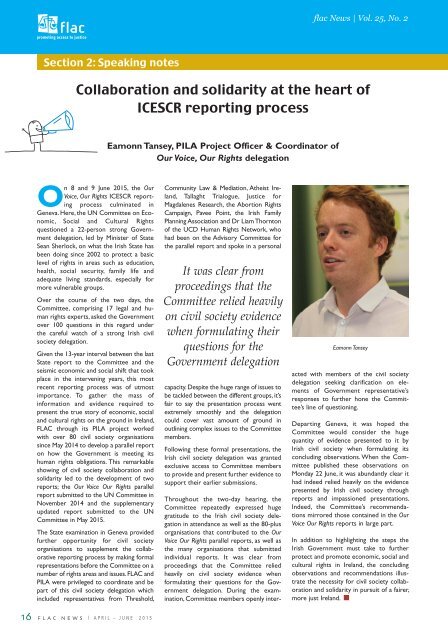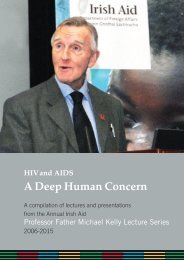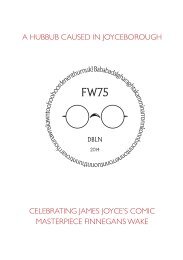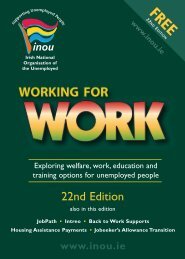FLAC News Summer 2015
You also want an ePaper? Increase the reach of your titles
YUMPU automatically turns print PDFs into web optimized ePapers that Google loves.
flac <strong>News</strong> | Vol. 25, No. 2<br />
Section 2: Speaking notes<br />
Collaboration and solidarity at the heart of<br />
ICESCR reporting process<br />
Eamonn Tansey, PILA Project Officer & Coordinator of<br />
Our Voice, Our Rights delegation<br />
On 8 and 9 June <strong>2015</strong>, the Our<br />
Voice, Our Rights ICESCR report -<br />
ing process culminated in<br />
Geneva. Here, the UN Committee on Eco -<br />
n o mic, Social and Cultural Rights<br />
questioned a 22-person strong Govern -<br />
ment delegation, led by Minister of State<br />
Sean Sherlock, on what the Irish State has<br />
been doing since 2002 to protect a basic<br />
level of rights in areas such as education,<br />
health, social security, family life and<br />
adequate living standards, especially for<br />
more vulnerable groups.<br />
Over the course of the two days, the<br />
Committee, comprising 17 legal and hu -<br />
man rights experts, asked the Govern ment<br />
over 100 questions in this regard under<br />
the careful watch of a strong Irish civil<br />
society delegation.<br />
Given the 13-year interval between the last<br />
State report to the Committee and the<br />
seismic economic and social shift that took<br />
place in the intervening years, this most<br />
recent reporting process was of utmost<br />
importance. To gather the mass of<br />
information and evidence required to<br />
present the true story of economic, social<br />
and cultural rights on the ground in Ireland,<br />
<strong>FLAC</strong> through its PILA project work ed<br />
with over 80 civil society organisa tions<br />
since May 2014 to develop a parallel report<br />
on how the Government is meeting its<br />
human rights obligations. This remarkable<br />
showing of civil society collaboration and<br />
solidarity led to the development of two<br />
reports; the Our Voice Our Rights parallel<br />
report submitted to the UN Committee in<br />
November 2014 and the supplementary<br />
updated report submitted to the UN<br />
Committee in May <strong>2015</strong>.<br />
The State examination in Geneva provided<br />
further opportunity for civil society<br />
organisations to supplement the collab -<br />
orative reporting process by making formal<br />
representations before the Com mittee on a<br />
number of rights areas and issues. <strong>FLAC</strong> and<br />
PILA were privileged to coordinate and be<br />
part of this civil society delegation which<br />
included representatives from Threshold,<br />
Com munity Law & Media tion, Atheist Ire -<br />
land, Tallaght Trialogue, Justice for<br />
Magdalenes Research, the Abortion Rights<br />
Cam paign, Pavee Point, the Irish Family<br />
Planning Association and Dr Liam Thornton<br />
of the UCD Human Rights Network, who<br />
had been on the Advisory Com mittee for<br />
the parallel report and spoke in a personal<br />
It was clear from<br />
proceedings that the<br />
Committee relied heavily<br />
on civil society evidence<br />
when formulating their<br />
questions for the<br />
Gov ern ment delegation<br />
capa city. Despite the huge range of issues to<br />
be tackled between the different groups, it’s<br />
fair to say the presenta tion process went<br />
ex tremely smoothly and the dele gation<br />
could cover vast amount of ground in<br />
outlining com plex issues to the Com mit tee<br />
mem bers.<br />
Following these formal presentations, the<br />
Irish civil society delegation was granted<br />
exclusive access to Committee members<br />
to provide and present further evidence to<br />
support their earlier submissions.<br />
Throughout the two-day hearing, the<br />
Committee repeatedly expressed huge<br />
gratitude to the Irish civil society dele -<br />
gation in attendance as well as the 80-plus<br />
organisations that contributed to the Our<br />
Voice Our Rights parallel reports, as well as<br />
the many organisations that submitted<br />
individual reports. It was clear from<br />
proceedings that the Committee relied<br />
heavily on civil society evidence when<br />
formulating their questions for the Gov -<br />
ern ment delegation. During the exam -<br />
ination, Committee members openly inter -<br />
Eamonn Tansey<br />
acted with members of the civil society<br />
delegation seeking clarification on ele -<br />
ments of Government representative’s<br />
responses to further hone the Com mit -<br />
tee’s line of questioning.<br />
Departing Geneva, it was hoped the<br />
Committee would consider the huge<br />
quantity of evidence presented to it by<br />
Irish civil society when formulating its<br />
concluding observations. When the Com -<br />
mittee published these observations on<br />
Monday 22 June, it was abundantly clear it<br />
had indeed relied heavily on the evidence<br />
presented by Irish civil society through<br />
reports and impassioned presentations.<br />
Indeed, the Committee’s recom men da -<br />
tions mirrored those contained in the Our<br />
Voice Our Rights reports in large part.<br />
In addition to highlighting the steps the<br />
Irish Government must take to further<br />
protect and promote economic, social and<br />
cultural rights in Ireland, the concluding<br />
observations and recommendations illus -<br />
trate the necessity for civil society collab -<br />
ora tion and solidarity in pursuit of a fairer,<br />
more just Ireland. n<br />
16 F L A C N E W S l A P R I L – J U N E 2 0 1 5





